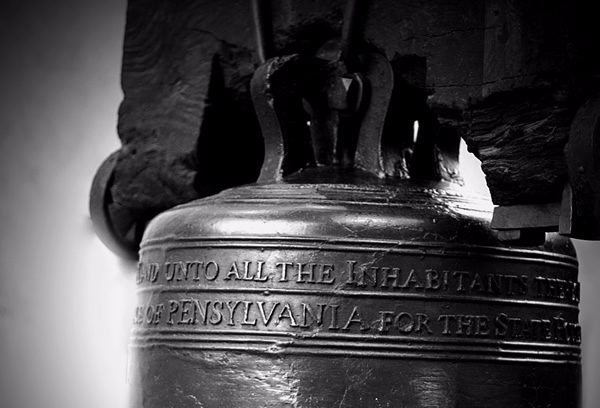 Parashat B’har/B’huqqotai
Parashat B’har/B’huqqotai
Leviticus 25:1 – 27:34
The Liberty Bell in Philadelphia takes its name from an inscription incised upon it. The inscription is a quote from a verse in our Torah reading. The verse appears after the Torah describes a series of seven-year cycles during which society is meant to renew itself by affirming universal equality of opportunity. Each of these seven-year cycles is culminated by the seventh, “Sabbatical” year. After seven such cycles, the fiftieth year, the Jubilee, pushes the Torah’s vision of freedom and equality even further. This Jubilee year brings about the liberation of all slaves. It is the year of liberty. Significantly, the Torah begins the famous Liberty Bell verse with this phrase, left off the Bell: “And you shall sanctify the fiftieth year.” This means that establishing universal freedom is not simply just; it is holy. Perhaps this part of the verse was left out because it sounded too religious. So, perhaps we, as supporters of a religious community, can allow ourselves to remember that elided part of the verse along with the rest of it.
The rest of the verse is cut into the Bell. It famously reads: “[And you shall] proclaim liberty throughout all the land and unto all the inhabitants thereof.” (Lev. 25:10) The verse literally reads: “You shall proclaim liberty in the land to all its inhabitants.”
Commentators have noticed that this verse applies the proclamation of liberty “to all [the land’s] inhabitants.” But shouldn’t the verse read, instead: “proclaim liberty to all the land’s slaves”? It is the slaves who lack liberty, after all. But many explain that the Torah seeks to teach us the when we free the slaves then we are all freed, as well.
To be an oppressor is to be enslaved. We engage in the enslavement of others for many reasons. We may fear and or loathe the people we subjugate. We may simply lack basic respect for them and fail to recognize that they are just as human as we are. The story of Israel’s enslavement in Egypt has all these elements in it. But all these motivations are based on falsehoods and fallacies. We become enslaved to our prejudices and our fears. We become enslaved to our false sense of security and power. We destroy our own freedom of spirit.
To release someone or some group from bondage is not to capitulate to some questionable, divisive sort of “identity politics” that seeks to reject one’s own legitimate self-interest. On the contrary, teaches the Torah, our own self-interest demands that everyone be free. There is nothing more potentially unifying than the abolition of our oppression of others. If anyone is not free, then none of us is free. That is the holy truth.
Shabbat Shalom,
Rabbi David Greenstein
![]()
Subscribe to Rabbi Greenstein’s weekly d’var Torah
Image: “The Liberty Bell in Philadelphia, Pennsylvania” by D. Nettleton is licensed under CC BY 2.0, image has been altered and is used with permission.
- Toby Stein: In Memoriam - Thu, Feb 8, 2024
- Faithfulness and Hope: Parashat Sh’lach - Thu, Jun 23, 2022
- Past Their Prime: Parashat B’ha`a lot’kha - Thu, Jun 16, 2022
